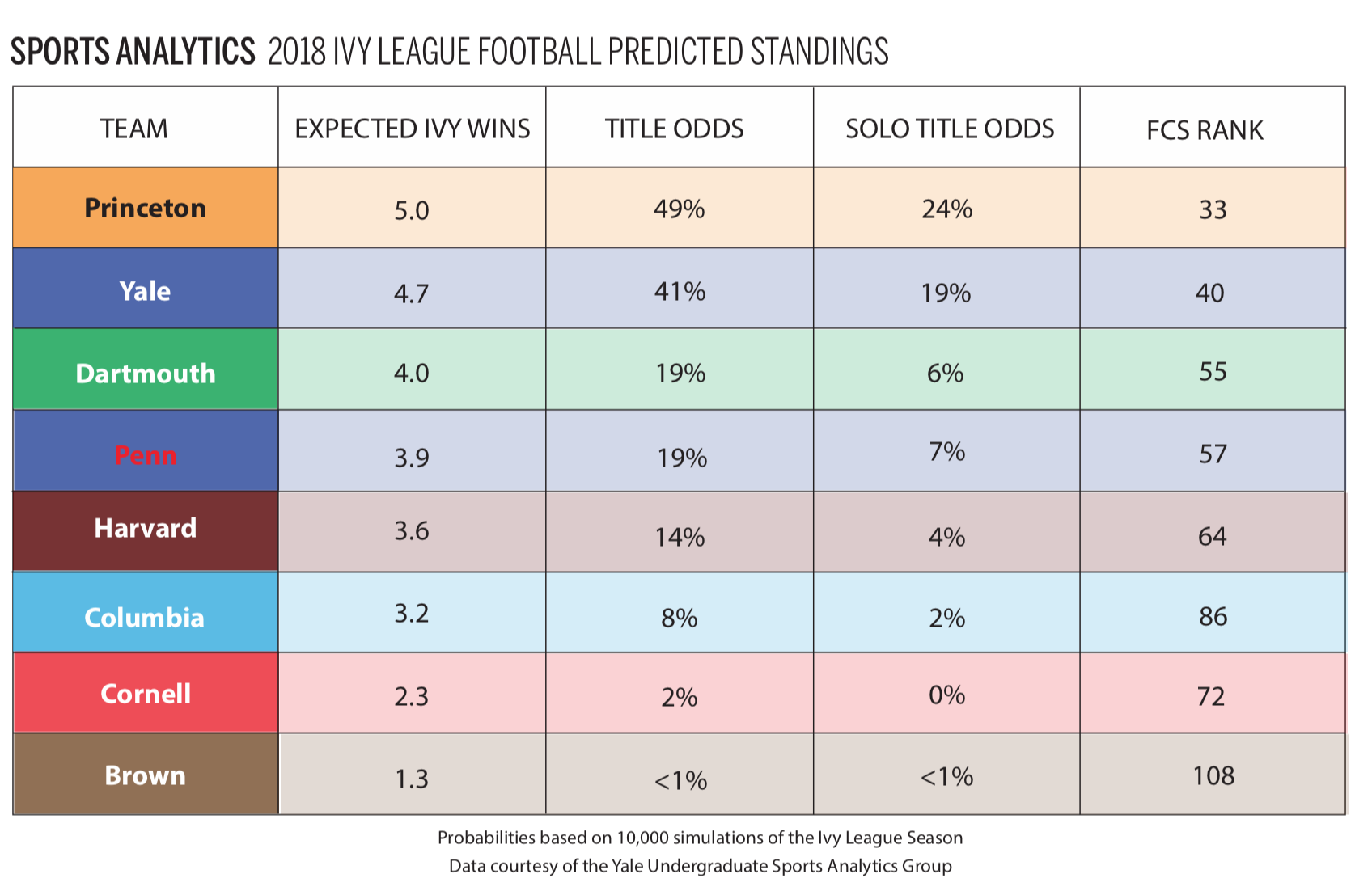
Jesse Nadel
With temperatures finally cooling along the East Coast, fall finally seems to be here. And that means two things: pumpkin spice lattes and Ivy League football. Yale enters the sea- son as defending league champion, looking to win back-to-back titles for the first time since the 1980–81 seasons. Using the football prediction model I built for the Yale Undergraduate Sports Analytics Group, I set out to answer some of the most interesting questions surrounding Team 146.
The model uses game results from the past three seasons, giving more weight to data from more recent seasons. I then used game-by-game odds set by the model to simulate the Ivy League season 10,000 times.
Yale won at least a share of the Ancient Eight championship in 41 percent of simulations, second only to Princeton, which won a piece of the league title in 49 percent of simulations. The Tigers and Bulldogs seem to be in a tier of their own, as the next likeliest teams to win a share of the title are Penn, at 19 per- cent; Dartmouth, at 19 percent; and Harvard, at 15 percent. Title probabilities sum to more than 100 percent due to the fact that more than one school can win an Ivy League title, and any school with the best conference record is considered a co-champion.
It may come as something of a surprise that Yale is not pegged as championship favorite given its record-setting dominance last season and the fact that the Elis were picked as favorites by the annual media preseason poll heading into 2018.
The difference in media predictions and statistically derived predictions has three main causes. The first is that the Bulldogs were nowhere near as good during the 2015 and 2016 seasons as they were in their run to the title last year, but this old data is still included in the model — albeit heavily weighted down compared to 2017. There are very few games in a single season, and as a result, luck drives a lot of variance within a single season that is reduced over longer time periods.
The second and, in my opinion, more fundamental reason the model of the Yale Undergraduate Sports Analytics Group, or YUSAG, favors Princeton this year is in large part bad luck last year. While fans might remember a 3–4 campaign in a down year following a 2016 Ancient Eight crown, the Tigers’ four conference losses came by a combined 11 points, and their net point differential of +66 was second only to Yale’s +98.
Finally, Princeton has four conference games at home this season compared to Yale’s three. Holding all other factors equal, playing at home increases a team’s chances to win a game by about 6 percent over a neutral field and 12 percent over a road game. All this, combined with Princeton’s historically high baseline level of performance gives them a slight edge in this year’s preseason YUSAG rankings.
While an 8 percent difference in championship percent- age may seem like a lot, the two schools differed on average by only about 0.25 wins, so to say that there is any significant gap between Princeton and Yale would be a gross overstatement.
A key factor in the title race may very well be the Nov. 10 Yale-Princeton game in New Haven, a game that, because of home-field advantage, the Elis will be slightly favored to win.
In fact, Yale is favored in every Ivy League game it plays this season, per my model, and will only be underdogs against Maine, a team pegged at No. 22 in the YUSAG FCS power rankings. Surely all fans will take solace in the fact that the Bulldogs enter the season with a 60 percent chance of beating Harvard for the third straight season.
There’s a reason games aren’t played on paper, but even on paper Team 146 has good reason to be excited heading into its season open Saturday at Holy Cross.
Luke Benz | luke.benz@yale.edu







